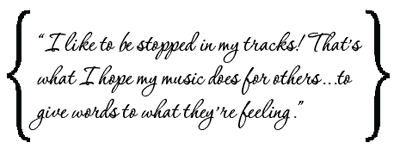Midway through our get-together over a tasty Vietnamese lunch, Saskatoon singer/songwriter Farideh (pronounced “fair-ah-day”) admits she’s not a fan of the cold Saskatchewan-trademark winter weather. In fact, she reveals a “deep hatred for the cold,” reminiscing how oftentimes she has trouble getting out of bed in the morning, as we’ve all experienced. Nonetheless, there exists an intriguing, seemingly magical synergy between Farideh’s music, and the weather which influences it; it’s this same atmospheric empathy that has inspired, in large part, the winterized yet warm, intimately isolated feel on Farideh’s new, and second album overall, Symphony of Chemistry, released just in time to welcome both 2009 and the winter season.
The album blends an intimate combination of folk, pop and classic country with a gospel seasoning. While discussing the great tone-setter and album opener “Heart of a Man,” Farideh proclaims, “The only thing more painful than love is winter!” The winter period is like heartbreak: “You never get used to it,” Farideh sings evocatively. Sung as a veritable prairie inhabitant.
In acknowledging what seems to be her least-favoured yet principal muse, Farideh reveals that she now does enjoy the winter period because it has allowed her to create some of her most passionate work. “I think ‘The Cold’ is a beautiful song,” Farideh suggests, and justly so; as the album’s potentially unassuming third last track, it remains one of its strongest, most encapsulating pieces. The golden age country n’ western chorus’ breathy yet drawn-out lyric “the cold” sends a beauteous chill up the listener’s spine, while inviting the listener to bundle another warm, auntie-sewn afghan tightly around themselves. The songs on Symphony not only excite the senses, but acclimatize themselves immediately to the listener’s ears. She adds, “I think winter is definitely the best time to listen to the album.” With “We Were Lovers,” Farideh claims that the song truly came alive “during the recording process…the song took on a completely new life unto itself in the studio, and now I love it!”
Surprisingly, Farideh had been on an extended break from writing music before the creation of Symphony of Chemistry. “Four years before I began on the new album, I basically quit.” Farideh felt it necessary to make sure that music was the right thing for her to do. Given the album’s engrossing emotional openness, her decision to return to music was certainly justified. Farideh feels that resonance is the most important element to her music; “Music for me is all about the emotional extension.”
She has a few songwriting aids that help define her own unique writing approach. She calls herself a “silent person”; while she says she doesn’t listen to much music, it is only because she prefers to make time for a fully-formed listening experience, where she can put an album on, lay in the middle of the floor, and “let the emotions overtake me.” She wants to feel, and wants others to “truly feel” her music when listening. When the music does overtake her, it completely absorbs her being. “I can’t focus on anything else, at that point!” Her writing approach comes from a similar emotional grounding. She finds a niche time to write: “I’m pushed to the brink of boredom to write a song.”
Symphony was written, Farideh reveals, during a time of unemployment, and therefore she was able to afford much more time to her project. Her relationship with her song is specifically related to “a certain experience,” which also explains why she’d rather write a quality, meaningful song rather than attempt to “write one-a-day.” Another songwriting tool is her plug-in heater. “I’m addicted to the sound of my heater!” she laughs. While most folks will find their in-home heaters most useful for, well, heating a certain room, Farideh says that the heater’s gentle hum allows her the peace of mind and emotional tranquility to focus on her songwriting.
Farideh recorded Symphony of Chemistry, for the most part, at her father’s recording studio, Studio Ruddell (in Ruddell, Saskatchewan) in a period of three to four months. 
Additional recording was done with Josh Palmer at PM Studios in Saskatoon. The album was birthed while Farideh was also working full-time: “I was so stressed,” she recalls, “it just about killed me!” She then jokes, “I probably lost a couple of years of my life, but that’s fine.”
Farideh’s father, Byron Olsen (from the well-loved Saskatchewan folk group Crooked Creek) not only lives in, but is also is mayor of the small town of Ruddell, located just south of North Battleford. Her father contributed significantly in the recording and performing aspects of the album. Farideh praises her father’s undeniably priceless help and guidance as her main inspirations during her album-making experience. While Ruddell can only boast eleven dwellings which host permanent residents, Farideh states there exists a fantastic artistic sense of community there. Regarding the small town recording process at Studio Ruddell, she says, “It was a really good way to make the album…This would have never happened if I hadn’t used the resources I had. I couldn’t sit around waiting for money to come my way.” She continues, “The townspeople are very supportive, but it can be a blessing and a curse; if they stop over for coffee, and you’re stressed to the nines!”
In fact, Farideh needed to remove herself from her regular Saskatoon lifestyle in order to properly finish her songs and get the album out. “I think songs are really funny, lively creatures,” Farideh giggles. “They have a life of their own, and your own songs have their own life and attract different people with different tastes.” Farideh’s own attraction to the American deep south (“I love the sass,” she says) has emerged in her songwriting; a strong gospel sense then also permeates the album, and Farideh cites Mahalia Jackson and The Blind Boys of Alabama as influences.
As a practitioner of the Bahá’í faith, Farideh aims “to be of service and just to share what’s in my heart” in both her music and volunteering. Her spirit has taken her to work and perform in Uganda. She says that the choir helped attract her to the area, and claims that the “soul and movement” of the Bahá’í people were amazing. She was fortunate to perform at the Ugandan National Theatre, with many people in attendance. She loves how the people there receive music “in a totally non-judgmental way.” Farideh claims that “having an affinity for other people’s cultures becomes really important” when it comes to her own personal relationship with music, helping to create connections all the faster.  As such, given her affinity to the Southern culture, Farideh looks forward to volunteering and performing in the southern United States.
As such, given her affinity to the Southern culture, Farideh looks forward to volunteering and performing in the southern United States.
For the longest time, her music’s intimate, personal essence made it difficult for her to express her artistic image in public. “Even postering made me nervous!” she chuckles. “I needed my boyfriend to help me put them up.” However, 2009 looks to be quite the year to expand her profile; she plans on becoming increasingly involved in all things touring and promotion. “I plan on booking a lot of shows this year, and as for the songwriting, I’m always somewhere around that, simply because it’s an extension of who I am.” She also hopes to become more adept at the piano, and might also record (fittingly) over next winter. However, there’s no rush as of now: “It’s more important that I love music first, that I love the product at the end.”
Farideh’s performance desires are equally exciting: “I want to play in a beautiful theatre, where my music just overtakes the audience… where my show is a beautiful show, and affects peoples’ lives.” If anything, she simply hopes that people will respond to her music. Reflecting on living in Saskatchewan, “I like the idea of a slower life,” Farideh says, as it helps her focus her perspective on songwriting. “We have this extreme climate that makes extreme people.” She loves being around friends and family at the same time. She is now quite prepared to throw herself fully behind her new album’s promotion and tour Canada.
For more on Farideh, visit:












